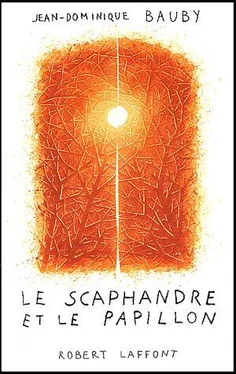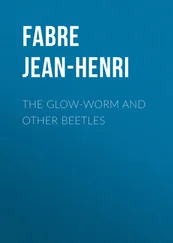Eons later, I become aware of an alarm sounding. The hostess with the Lebanese accent hoists me on her back and climbs the staircase with me. “We have to get out: the police are on their way.” Outside, night has fallen and the snow has stopped. An icy wind takes my breath away. The dazzling beam of a searchlight mounted on the overpass probes the forlorn automobile carcasses.
“Give up, you're surrounded!” blares a loudspeaker. We manage to get away, and I wander about, utterly lost. I long to escape, but every time the chance arises, a leaden torpor prevents me from taking even a single step. I am petrified, mummified, vitrified. If just one door stands between me and freedom, I am incapable of opening it. Yet that is not my only terror. For I am also the hostage of a mysterious cult, and I fear that my friends will fall into the same trap. I try desperately to warn them, but my dream conforms perfectly with reality. I am unable to utter a word.
I have known gentler awakenings. When I came to that late-January morning, the hospital ophthalmologist was leaning over me and sewing my right eyelid shut with a needle and thread, just as if he were darning a sock. Irrational terror swept over me. What if this man got carried away and sewed up my left eye as well, my only link to the outside world, the only window to my cell, the one tiny opening of my diving bell? Luckily, as it turned out, I wasn't plunged into darkness. He carefully packed away his sewing kit in padded tin boxes. Then, in the tones of a prosecutor demanding a maximum sentence for a repeat offender, he barked out: “Six months!” I fired off a series of questioning signals with my working eye, but this man—who spent his days peering into people's pupils—was apparently unable to interpret a simple look. With a big round head, a short body, and a fidgety manner, he was the very model of the couldn't-care-less doctor: arrogant, brusque, sarcastic—the kind who summons his patients for 8:00 a.m., arrives at 9:00, and departs at 9:05, after giving each of them forty-five seconds of his precious time. Disinclined to chat with normal patients, he turned thoroughly evasive in dealing with ghosts of my ilk, apparently incapable of finding words to offer the slightest explanation. But I finally discovered why he had put a six-month seal on my eye: the lid was no longer fulfilling its function as a protective cover, and I ran the risk of an ulcerated cornea.
As the weeks went by, I wondered whether the hospital employed such an ungracious character deliberately—to serve as a focal point for the veiled mistrust the medical profession always arouses in long-term patients. A kind of scapegoat, in other words. If he leaves Berck, which seems likely, who will be left for me to sneer at? I shall no longer have the solitary, innocent pleasure of hearing his eternal question: “Do you see double?” and replying—deep inside—"Yes, I see two assholes, not one.”
I need to feel strongly, to love and to admire, just as desperately as I need to breathe. A letter from a friend, a Balthus painting on a postcard, a page of Saint-Simon, give meaning to the passing hours. But to keep my mind sharp, to avoid descending into resigned indifference, I maintain a level of resentment and anger, neither too much nor too little, just as a pressure cooker has a safety valve to keep it from exploding.
And while we're on the subject, The Pressure Cooker could be a title for the play I may write one day, based on my experiences here. I've also thought of calling it The Eye and, of course, The Diving Bell . You already know the plot and the setting. A hospital room in which Mr. L., a family man in the prime of life, is learning to live with locked-in syndrome brought on by a serious cerebrovascular accident. The play follows Mr. L.'s adventures in the medical world and his shifting relationships with his wife, his children, his friends, and his associates from the leading advertising agency he helped to found. Ambitious, somewhat cynical, heretofore a stranger to failure, Mr. L. takes his first steps into distress, sees all the certainties that buttressed him collapse, and discovers that his nearest and dearest are strangers. We could carry this slow transformation to the front seats of the balcony: a voice offstage would reproduce Mr. L.'s unspoken inner monologue as he faces each new situation. All that is left is to write the play. I have the final scene already: The stage is in darkness, except for a halo of light around the bed in center stage. Nighttime. Everyone is asleep. Suddenly Mr. L., inert since the curtain first rose, throws aside sheets and blankets, jumps from the bed, and walks around the eerily lit stage. Then it grows dark again, and you hear the voice offstage—Mr. L.'s inner voice—one last time:
“Damn! It was only a dream!”
This morning, with first light barely bathing Room 119, evil spirits descended on my world. For half an hour, the alarm on the machine that regulates my feeding tube has been beeping out into the void. I cannot imagine anything so inane or nerve-racking as this piercing beep beep beep pecking away at my brain. As a bonus, my sweat has unglued the tape that keeps my right eyelid closed, and the stuck-together lashes are tickling my pupil unbearably. And to crown it all, the end of my urinary catheter has become detached and I am drenched. Awaiting rescue, I hum an old song by Henri Salvador: “Don't you fret, baby, it'll be all right.” And here comes the nurse. Automatically, she turns on the TV. A commercial, with a personal computer spelling out the question: “Were you born lucky?”
When friends jokingly ask whether I have considered a pilgrimage to Lourdes, I tell them I've already made the trip. It was the end of the seventies. Joséphine and I were in a relationship that was a little too complicated to weather a traveling vacation together. It turned out to be one of those unstructured holidays that contain as many germs of potential discord as a day has minutes. We set out in the morning without knowing where we would sleep that night (and without knowing how we would reach our unknown destination). For two people to get along on such a trip requires a high degree of tactfulness. Joséphine was the kind of person who was prepared to do what it takes to get her own way. I tend to be like that too. For a whole week, her pale-blue convertible was the theater of an ongoing mobile domestic crisis. I had just finished a hiking trip in Ax-les-Thermes—an incongruous interval in a life devoted to everything except sport! The hike concluded at the Chambre d'Amour, a little beach on the Basque coast where Joséphine's uncle had a villa. From there, we made a tempestuous and magnificent crossing of the Pyrenees, leaving behind us a long trail of remarks on the order of “First of all, I never said any such thing!”
The prime bone of this quasi-marital contention was a fat book six or seven hundred pages long, with a black-and-white cover and an intriguing title. Trail of the Snake told the tale of Charles Sobraj, a kind of wayfaring guru who charmed and robbed Western travelers between Bombay and Kathmandu. The story of Sobraj, the half-French, half-Indian “snake” of the title, was true. Apart from that, I am quite unable to provide the slightest detail; it is even possible that my summary is inaccurate. But what I recall perfectly is the spell Charles Sobraj cast over me. On the way back from Andorra, I was still willing to lift my nose from the book to admire a landscape, but by the time we reached the Pic du Midi, in southern France, I refused point-blank to leave the car long enough for the stroll to the observation point. To be fair, a dense yellowish fog had rolled in over the mountain, reducing visibility and the attractions of such a stroll. Nevertheless, Joséphine dumped me there for a couple of hours while she sulked alone among the clouds. Was it to exorcise the serpent's spell that she insisted on a detour to Lourdes? Since I had never been to this world capital of miracles, I readily agreed. In any case, to my fevered brain, Charles Sobraj had blended into Bernadette, and the waters of the Adour River had mingled with those of the Ganges.
Читать дальше












